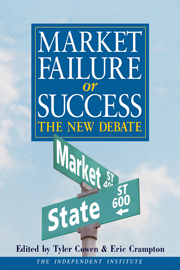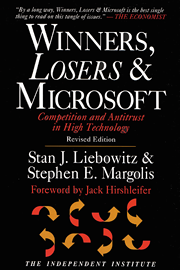Everyone knows by now that Judge Penfield Jackson’’s findings of fact in the long-running antitrust case against the software giant Microsoft sided with the government on almost every point, large or small. His ringing endorsement of their case must have been beyond even the most extravagant hopes of the attorneys and economists in the Justice Department and their corporate supporters who instigated this case in the first place-firms such as Sun, Oracle and Netscape.
But what are the implications of the judge’’s findings for Microsoft, its rivals, high-tech industries - and for the rest of us, the great mass of consumers? For Microsoft, the news is certainly bad, but not totally unexpected. From the beginning it was thought that the judge had some hostility toward the company, based on a previous run-in with it in 1997. At issue then was the Justice department’’s claim that Microsoft had violated a prior consent decree by not allowing computer vendors to remove its browser icon from the desktop.
This dispute served as a miniature preview of the later case. Jackson issued an injunction forcing Microsoft to offer computer vendors a version of Windows with the browser removed, even though the Department of Justice had not asked for such an injunction. Microsoft, in a fit of childishness, thumbed its nose at the judge by interpreting his order literally, removing the browser files and offering computer vendors one version of Windows with the browser and another version of Windows that didn’’t work at all. Several weeks later, Microsoft did provide a working operating system with the browser removed.
Eventually, the judge was overruled by an appeals court panel for his overzealous issuing of the injunction in the first place, in a decision arguing that the courts should not be involved in determining what went into an operating system.
So it was all but certain that Microsoft expected to be found to have abused monopoly power by Jackson. Its goal, presumably, was to win in the same court of appeals that had previously overturned Jackson’’s operating-system injunction.
By his unusual move of separating the findings of fact from his findings of law, Jackson seems to want to shield his decision from being overturned, since appellate bodies often let findings of fact stand.
Yet if this was indeed Jackson’’s reasoning, it may end up backfiring. Some of his findings are so one-sided as to be both ludicrous and dangerous to the technology industry. Take, for example, the definition of the relevant market.
Does the Macintosh belong in the same market as Windows PCs? Common sense tells us that they are substitutes - and almost any computer user would confirm that indeed they are. But the judge, apparently unwilling to make even this minor concession in Microsoft’’s favor, concludes that the Macintosh does not compete with Windows PCs because it is costly for consumers to switch from one to another. His findings could be considered a threat to other computer manufacturers - or any other firms that have an important set of third-party products that work alongside the main product - since all such firms could be considered monopolists under this definition.
If the Macintosh is not a substitute for the PC, then the PC must not be a substitute for the Macintosh. Apple, therefore, must be a monopoly since it has a 100 percent market share in its relevant market. And Sun must be one as well.
Being declared a monopolist opens these companies up to far greater antitrust scrutiny, since monopolies are held to different and far more stringent antitrust standards of conduct.
Jackson’’s decision is even more confused on the question of pricing. He says that even though he believes (based on some of the scantiest evidence imaginable) that Microsoft’’s’’ prices were above the competitive level, if Microsoft could prove otherwise it would have no relevance to his finding of monopoly pricing. This puts Microsoft in the impossible position of being guilty regardless of the evidence on pricing - something that normally would be a very important factor in a monopolization case.
Jackson also provides a distressing signal to other antitrust defendants by relying on what he calls the "intractable chicken-and-egg problem," otherwise known as the theory of the lock-in. This theory holds that a dominant product might remain entrenched in the face of a superior rival product if the competing manufacturer can’’t coordinate consumers (and producers of complementary goods). Jackson claims that even if everyone preferred Microsoft’’s operating system, we all (including applications programmers) might think everyone will stick with Windows to get its large set of applications. He calls this an "application barrier to entry." Jackson neglects to explain how the first operating system overcame these barriers, and why, if one firm can overcome them, new ones cannot. This logic, followed to its ultimate conclusions, implies that cars cannot exist, since there wouldn’’t be any gas stations without cars, and no cars without gas stations. Similarly, consumers couldn’’t have moved from records to CDs, or eight tracks to cassettes, and so forth. This is an interesting paradox, but after decades of research with my colleague Stephen Margolis, I can report there are no known examples of superior entrants that were not able to vanquish inferior incumbents. And indeed, in software markets, we found that leaders were more likely to have their leads quickly disappear than in other markets. Will Jackson’’s totally unsupported theory be allowed to play a dominant role in the antitrust actions in high technology markets? We will have to wait and see.
Surely, however, it is dangerous to allow pure fiction to control our economic reality.
But the most important question is the effect of the judge’’s reasoning on ordinary citizens, those who purchase consumer software. Antitrust law is supposed to help consumers, after all, not firms that compete with Microsoft.
Nevertheless, Jackson devotes a mere five out of 412 paragraphs to the issue of consumer harm. The only direct consumer harm he can cite concerns things like the extra disk space that the operating system takes up for capabilities that the consumer will not use, or the extra efforts required of parents wishing to remove the browser to keep their children from accessing the World Wide Web. But leaving aside these fairly fatuous "harms" to consumers, the most serious impact of a final ruling based on the Jackson decision will be what a weakened Microsoft would do to consumers’’ pocketbooks. Without Microsoft, it is likely that the sharp declines in software prices that we have gotten used to might come to an end. You can understand why other software producers might cheer this event, just as many small retailers would be happy if Wal-Mart disappeared. But in both scenarios, consumers would lose out. Again, our research found that software prices fell by an average of 15 percent from 1985 to 1995 in those markets where Microsoft did not compete. In markets where Microsoft competed, on the other hand, prices fell by 65 percent. Spreadsheet and wordprocessor prices did not fall until Microsoft’’s products started to become the standard. Without Microsoft, we might be using the more expensive OS/2, which had two versions, a complete version that would only run on IBM PCs, and a "lite" version for other computer brands.
Nor has Microsoft’’s alleged market dominance forced consumers to settle for lower quality. Indeed, if the court had examined software quality, it would have discovered that Microsoft, as well as other software firms, has only succeeded when quality was high. This, too, has been borne out by our research, based on an examination of more than a thousand software reviews.
Based on this evidence, it is quite clear that consumers will not be beneficiaries of Judge Jackson’’s decision. We can only hope now that an appeals court will have the good sense to keep fiction from masquerading as fact.










